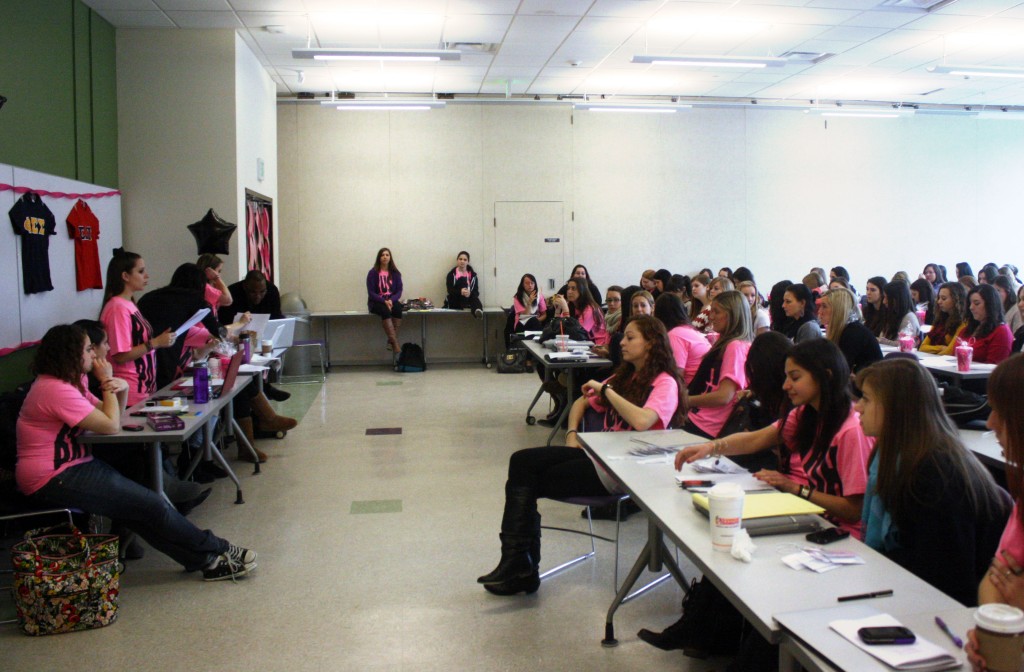
Spring recruitment began this semester with two fewer sororities vying for new members.
Panhellenic rush, which began Sunday, is a time for female students to meet existing sisters and select a sorority to pledge.
However, this spring rush is expected to be quite different from the past. Within the past year, two Panhellenic sororities were kicked off campus, leaving Greek Life with only four chartered social sororities — Alpha Epsilon Phi, Delta Phi Epsilon, Phi Sigma Sigma and Sigma Delta Tau — participating in spring rush.
Binghamton University’s chapter of Alpha Xi Delta (AZD) lost its charter last October. AZD’s National Council decided to investigate BU’s Zeta Phi chapter after receiving complaints from a student who had pledged the sorority, but then dropped out.
The Eta Zeta chapter of Alpha Phi was suspended in September for breaking the national organization’s rules regarding pledging and for not cooperating with an internal investigation, according to Sunni Solomon, assistant director of Greek Life at BU.
Solomon has referred to this loss as a “black eye for the community.” However, Mr. Solomon and other members of the Greek community have a vision of expansion.
In order to pledge, students must have earned a minimum of 12 credit hours at BU and attained at least a 2.5 GPA.
Vanessa Ross, a member of SDT, treasurer of the Panhellenic Council and a junior majoring in finance, said sororities have done their best to familiarize girls with the recruitment process and increase the size of the Greek community.
“Being involved in Greek Life has been such a great experience and despite the loss of two on-campus sororities, we are trying to improve Greek Life as a whole and make it a more welcoming place for all the girls who are interested,” Ross said.
Brittany Roser, president of Delta Phi Epsilon and a junior double-majoring in biology and chemistry, explained that Pan-Hel has hosted more pre-rush events this year than ever before. Some of these include pizza parties, a cram jam for finals and a recent Zumba event.
“We’re really trying to branch out and get girls outside the cookie-cutter image,” Roser said.
With about 100 girls signed up to rush and only four sororities, each one is expecting a larger quota for the incoming class of girls than they have seen in previous semesters.
Jenna Cohen, a freshman majoring in psychology, said she signed up for rush this year because she is “looking for a solid group of girlfriends to turn to for anything and everything.”
“I wanted to rush to expand my horizons and see if Greek Life would be a fit for me,” Cohen said.
Jasmine Carrig, a junior majoring in English, said sorority rush is not always positive.
“In my opinion I think that a lot of the time joining a sorority is about social hierarchy,” Carrig said. “The atmosphere seems competitive and negative.”
It is quite difficult for girls to choose the “right” sorority for them and, according to Solomon, for sororities to choose the “right” girls in the few days of recruitment.
“In the short period of time that they get to meet these girls, I think they are looking for someone who will fit in and complement the chapter,” Solomon said. “Someone who sees the values of sisterhood, wants to be part of something larger, has a good work ethic and is academically sound.”
This semester sororities are using a new computer system that has been effectively used among schools with a much larger Greek population, according to Solomon. The new Bid Matching system, known as “Release Figure Method” or RFM, is used to help make better matches. The system will strengthen the weaker chapters because it allows sororities to better meet their quotas, according to Solomon.
Samantha Vulpis, president of the Panhellenic Council and a junior double-majoring in finance and political science, is looking forward to using RFM.
“This new computer system is a step forward for us and makes rush much easier,” Vulpis said.
While parts of rush are changing because of the loss of sororities and increase of rushes, some things will stay the same.
There will still be three rounds of recruitment that include one informal round where the pledges meet all the sororities, a second round where the sorority sisters put on a skit and choose the girls they think work best with their sorority and a third, formal round in which senior sorority members make speeches and the rushes rank their top sororities, according to Roser.
Roser said rush is more than a superficial time to meet people; rather, it is a time to get to know people.
“Rush is designed so the girls can meet the sisters of the sorority on a deeper level than what classes you’re taking and where you live on campus,” Roser said. “As corny as it sounds, going to rush helps you meet the girls that will be your best friends forever.”
Katy Kam, a senior majoring in psychology, is not excited for spring rush.
“I don’t think the social sororities are as great as the professional ones because the professional ones at least have a goal and purpose,” Kam said. “I feel like they are only looking for certain types of friends to party with. I also think a lot of people are rushing because they are lured in by stereotypes.”


